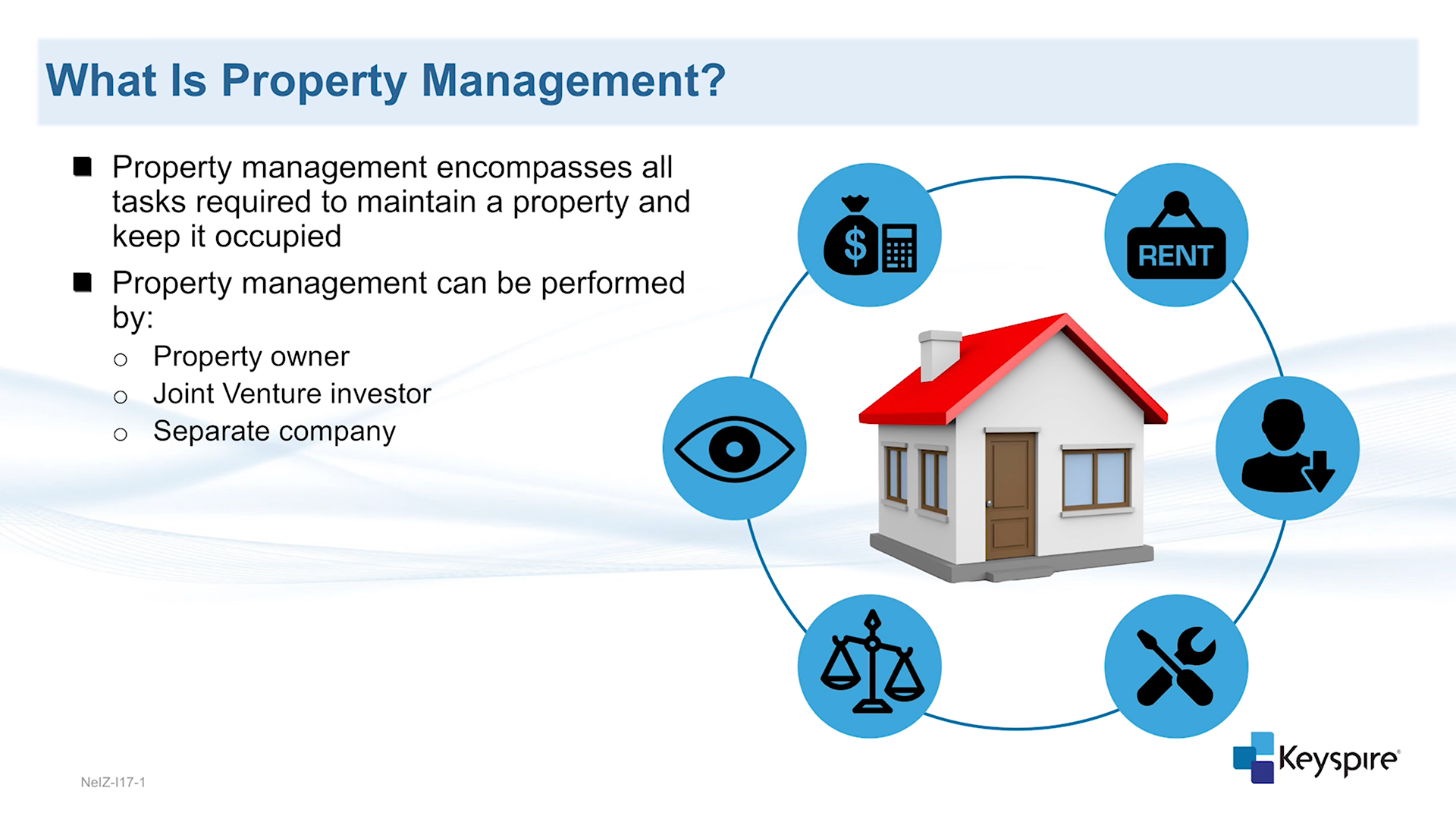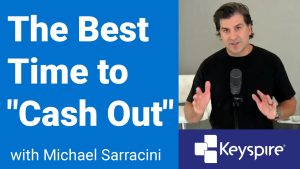Getting Started with Property Management

Welcome to the Property Management Basic Session of the Property Management Course. In this session, we will discuss what property management is and the various responsibilities that fall under property management. We will then identify why property management is important to investors, focusing on properties: specifically Buy and Hold or Lease to Own.
Finally, we’ll explore some of the ways to get started with managing your own properties. Some of the Key Terms you’ll hear in this session:
Property Management: An individual or company responsible for the day to day functioning of a piece of real estate landlord tenant law laws, which vary depending on location that outline the duties and rights of both landlords and tenants.
Lease: A written agreement between an owner and a tenant under which the owner allows the tenant the right of exclusive use of the property for a specified time, rent and terms.
Cash: The amount of cash available at the end of the year after expenses. Debt service and vacancy is subtracted from income vacancy, available rental units that are vacant or unoccupied.
Buy and Hold: A property purchased with the intention to own it for an extended period of time with no short-term intention to sell.
Turnkey Property: A property that is fully renovated or in move in condition. This property may be purchased fully tenanted with property management in place or ready for tenants to move in immediately
Return on Investment or ROI: The measurement of return on an investment relative to the capital invested. ROI is calculated as The 4 Ways to Win over capital invested, and expressed as a percentage.
So what is property management exactly? Property management, whether performed by yourself, a joint venture investor, or a separate company you hire to manage your investment property, encompasses all tasks required to maintain the property and keep it occupied regardless of who is actually managing the property, property management includes a number of responsibilities that you as an investor should be aware of.
Let’s briefly introduce these various responsibilities, which include but are not limited to: tenants, maintenance and repairs, knowledge of the landlord, tenant law, supervising, and managing the budget and taxes.
Future sessions in this course will discuss property management responsibilities in more detail. The first major responsibility we’re going to discuss is rent, including setting rent, collecting rent, and adjusting rent if necessary.
Depending on the specific situation, the rent would be set by either the investor, the property manager, or the joint venture investor. From there, the property manager would be the one who collects the rent from the tenant. Each year, the rent can be increased by a fixed percentage, depending on state, provincial, or municipal laws. Again, any increases or decreases to rent is determined by either the property manager or the investor, depending on the situation.
Another major area of responsibility for property managers revolves around managing tenants, which itself has a number of responsibilities. Property managers must find good applicants. Screen those applicants, select the perfect tenants, handle leases, handle complaints and emergencies, and finally handle move outs or evictions.
We’ll discuss these in more detail in various sessions of this course.
Property managers are also in charge of the physical management of the property, including day-to-day maintenance as well as repairs. Day-to-day maintenance tasks could include landscaping duties, snow removal, and trash removal to name a few.
If an issue arises and requires repair, it’s also the property manager’s responsibility to fix any problem. Since the property manager is dealing so closely with the tenants on a frequent basis, it’s vital for the property manager to have a full understanding of the landlord tenant law for the area the property is in.
There are various state, provincial, and municipal laws regarding the proper ways to screen a tenant, handle security deposits, terminate a lease, evict a tenant, and comply with property safety standards to name a few. To maintain a cash flowing property, these laws must be understood and followed. In some situations, property managers are also responsible for supervising employees working in the property and for supervising vacant properties.
If there are employees working on the property such as concierge or security personnel, the property manager must maintain and manage these relationships. Additionally, property managers must ensure that any vacant properties under their management are routinely maintained. Property managers are also responsible for staying within the set budget for the property and for maintaining the property’s records, such as sign leases, maintenance cost, and list of complaints.
Finally, property managers can either help owners file their taxes, or alternatively be endowed with the power to file the taxes on behalf of the owner. Unless, of course, the property manager is also the owner. With so many crucial responsibilities falling under property management, it’s easy to see why it’s so important.
Your main goal as a real estate investor is to receive a return on your investment and build your wealth well. Unless your investment properties are rented out to tenants and you have no vacancies, you won’t be able to see cash flow. If you decide to manage your own properties, you’ll have to consider the cost of your time.
If you are going to work with a joint venture investor, you will want to consider alignment of your goals and investment strategies. If you’re going to hire a third party company, you will want to consider the financial cost and management of the property manager. As you can see, regardless of your decision, property management comes with some important considerations.
Your final decision will be determined by your specific investor profile. Keep in mind the cost of time or money for property management is one that should not be skimped on. Savvy investors understand good property management can make the difference between successful investors and those who leave the business because of poor experiences.
Ultimately to build your wealth through real estate investing in rental properties, you need to have paying tenants renting your investment properties to manage a successful portfolio of investment properties. You or your property manager need to complete a long list of critical tasks to ensure your property is fully tenanted.
Avoid vacancy or nonpayment of rent. Ensure the property is maintained and operating efficiently, and work to make management scalable so your portfolio can continue to grow and grow. This brings us to our main point. Property management is important because it puts well qualified paying tenants in your properties.
It ensures efficient day-to-day operation, and it provides overall continued maintenance to your portfolio. Solid property management can be the key to long-term wealth because once you obtain the investment, you want to ensure it continues to produce ROI as you originally project. If you are not yet sure if managing an investment property is right for you, you do have the option of starting small.
If possible, you can begin with renting out a unit in your own home. You may have a property with a basement, income suite or a basement with the opportunity to add a legal income suite. Some properties have granny suites, a secondary suite, or a mother-in-law. These can include an above garage unit, a lane way house, or an additional structure on the property.
If you own one of these or have the option to add one, you can begin managing a rental property on a smaller scale. This will provide you with some extra income and allow you the opportunity to see if you like being a landlord. Of course, some people are not comfortable with the thought of strangers living in their homes, so you will want to assess your comfort.
Some potential landlords choose to rent to friends or family if the unit is on the same property as their main residence. This may give you a greater sense of security, but always remember that this is a business relationship. Be sure you are comfortable talking about money, can agree upon lease terms in writing, and that you won’t have to chase them each month for the rent.
If you are renting to friends or family, you also want to make sure you are very clear about each other’s privacy and the terms of the lease. Think about what could happen if one of you wanted to end the landlord tenant relationship. You may discover that property management is not for you and you don’t want to be known as the one who kicked out Aunt Sally.
Finally, if you do choose to convert part of your residence to a rental unit, be sure it meets all zoning laws for your municipality. Alternatively, you may decide to test out property management by managing properties of other Keyspire members. Property management is a relatively low cost way to get into real estate investing.
It requires time, organization, customer service skills, and an understanding of local regulations, but it doesn’t require a lot of capital. So it’s a great earned income strategy for those who can’t afford to purchase a property themselves. Since some investors choose to invest in properties that are far away from their primary residential location, they would need to hire property managers to manage their investment properties.
Take advantage of your Keyspire network and seek out opportunities where you can manage properties, perhaps even on a part-time basis. For members who are investing from afar, just be sure to check local regulations as some states and provinces require licenses for property managers to manage other people’s properties.
Perhaps you want to keep your home and real estate investments separate, or perhaps you are not interested in forming a joint venture with another investor. Instead, you may want to own an investment property. As with all investments, the smaller you start, the smaller the risk you take on. However, once you decide to take on more of an investment, you also exponentially increase your potential returns on that investment.
The real estate investment strategy we will be discussing here is mostly Buy and Hold wherein you purchase the property, perform any repairs if necessary, and then maintain that property as a positively cash flowing investment. One strategy that you may choose to use for your first Buy and Hold is to purchase a turnkey property that is already tenant occupied.
This means that the property is already rented and you just take over the lease as the new landlord. You start collecting the rent right away, so it is a very easy transition. However, remember that when you purchase a turnkey property, you are purchasing a property that has all of the work already done, so you won’t have to perform renovations, advertise the property or screen tenants, which means less work for you.
But you often pay more to purchase this type of property. As you gain experience as a real estate investor, you will most likely want to diversify your portfolio. You can then look at expanding into different types of rental properties, purchasing in different locations, and or investing in different cash flow types.
These can include properties requiring more renovations. You will be able to purchase them at a lower price, but you will also have to factor rehab costs into your expenses or purchasing underperforming properties, including those with potential for future expansion or development. This can also be a great investment to take on with a joint venture investor.
In this strategy, you work with another investor who provides cash for the purchase credit to secure financing, sweat equity for any necessary repairs, or the day-to-day property management. Or some combination of these. You then split the profits, which will reduce the amount you make on each individual deal, but allows you to do more deals, spread your investible capital further, and possibly make better investments overall.
When determining whether property management is right for you, be sure to assess your investor profile and your specific situation to make property management decisions that work for you. Remember, you are building your real estate portfolio to increase your wealth.
And to do so, you need to determine what your time and money situations can allow. Refer to the Determine your Investor Profile course on the member dashboard for more information, regardless of who is managing your property, which we will discuss in the “Who should Manage your Property” session of this course.
Make sure your property has positive cash flow and total return on investment that aligns with your investing goals. That is what will make it a strong real estate investment. Before we further explore property management, let’s check your understanding of the basic concepts we’ve discussed so far.
What are our property manager’s major responsibilities?
What are some ways to get started with property management?
What are some property management responsibilities that relate to day-to-day maintenance?
How does property management affect cash flow?
This concludes the property management basic session of the property management course.
Recent Blogs
The Best Time To “Cash Out” Is…
“When should I ‘cash out’ and sell my properties?” I hear this question a lot and it blows my…
Attract Higher Paying Tenants by Being Pet Friendly!
Optimizing an investment property is all about maximizing your income and minimizing your workload and expenses, such as tenant turnover.…
The 7-Step JV Process
“It’s better to own 10% of 100 properties than 100% of 1 property.” No matter how wealthy and successful…
Income Vs Net Worth
In today’s world, two of the most important financial metrics are income and net worth. Understanding the distinction between the…




